The UK Covid-19 Inquiry Newsletter dated October 2024.
Download documents
View this document as a web page
Message from Kate Eisenstein, Deputy Secretary to the Inquiry and Director of Policy, Research and Legal
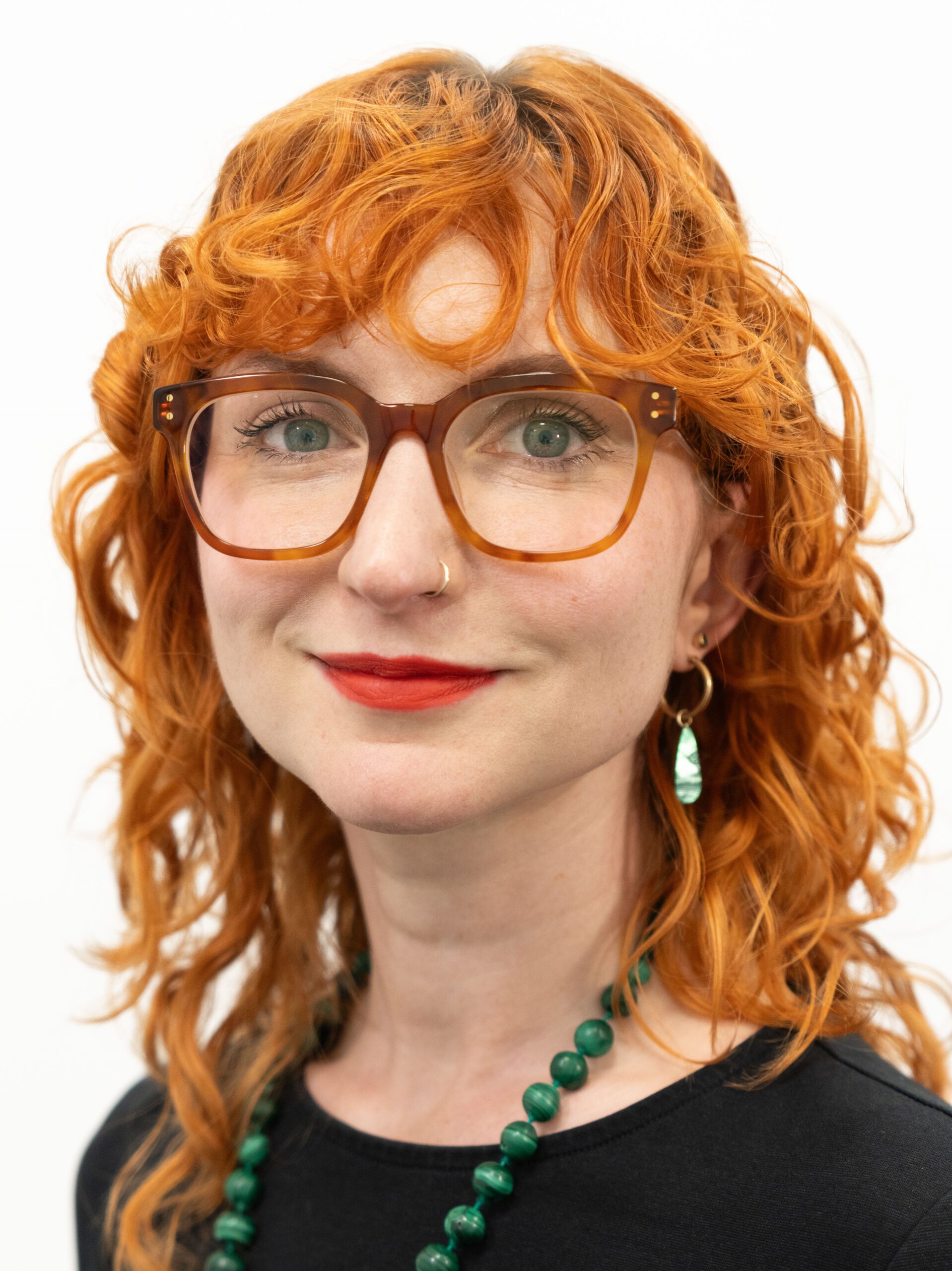
Welcome to our October newsletter. We are now in our sixth week of public hearings for our investigation into the impact of the pandemic on healthcare systems across the UK (Module 3), with a further four weeks to go. In this time we have heard from over 60 witnesses, including bereaved family members, patients, healthcare professionals, the Chief Medical Officers of Scotland, Wales, Northern Ireland and England, medical experts and representatives of professional associations. The Inquiry’s Chair, Baroness Hallett, considers all the evidence, the oral evidence deployed during public hearings and the written evidence gathered, when she makes her findings and recommendations.
Every Story Matters is our way of listening to the impact of the pandemic on the UK population. The Module 3 Every Story Matters Record was put in evidence by Inquiry Counsel Jac Carey KC at the beginning of the Module 3 hearing. It provides invaluable insight and has helped inform key lines of enquiry during the course of the module hearings.
I joined colleagues at one of our Every Story Matters events in Coventry to listen to members of the public describe their experiences of the pandemic. We’re holding these events to help fulfil the requirement in Baroness Hallett’s Terms of Reference to listen to the experiences of those who have suffered hardship or loss as a result of the pandemic. I would like to thank all those who have taken the time to share their experiences to date – this is such an important part of the Inquiry process and will shape our investigations not only into healthcare but other important areas such as social care, vaccines, children and young people and the economic response to the pandemic.
Our events programme is continuing to provide people across the country with the opportunity to share their experiences in person. In addition to Coventry, this month we went to Southampton, Nottingham and Leicester and will be visiting more towns and cities in the new year.
If you can’t make it to one of our events, you can share your story with us online at any time that is convenient to you. Anyone currently 18 or over who was in the UK during 2020-22 is encouraged to tell us about how the pandemic impacted their lives. Children’s experiences are being heard separately through a dedicated research project, Children and Young People’s Voices, to make sure we understand the different ways in which children across the UK have been affected by the pandemic.
Thank you for your interest in the Inquiry and I look forward to meeting some of you in person at our hearing centre or at one of our Every Story Matters events across the UK.
Inquiry timescales and how we will monitor our recommendations
Some newsletter subscribers have asked questions via our feedback form about the length of the Inquiry and when recommendations will be shared. We are keen to respond to your feedback and provide an explanation below.
How long will the Inquiry take? When are we sharing recommendations?
The impact of the pandemic on the UK is a hugely complex issue. It will take time to collect and interrogate detailed evidence about what happened, how different people and communities were affected, and how our response to any future pandemic or civil emergency could be improved. The Inquiry’s chair, Baroness Heather Hallett, currently expects to complete public hearings in early 2026.
Baroness Hallett wants her recommendations to be published as soon as possible. To do this, the Inquiry has split its work into investigations, known as modules, each with a different area of focus – more information on these can be found via the structure of the Inquiry page of the website. Baroness Hallett will publish her findings and recommendations in a report for each module as soon as they are ready, rather than in a single report at the very end of the Inquiry.
We have published our first report into preparation and resilience earlier this year. Future reports will detail Baroness Hallett’s findings and recommendations on topics such as decision making, healthcare, vaccines, social care, children and young people, the economic response to the pandemic and the impact of the pandemic on society, including bereavement and mental health.
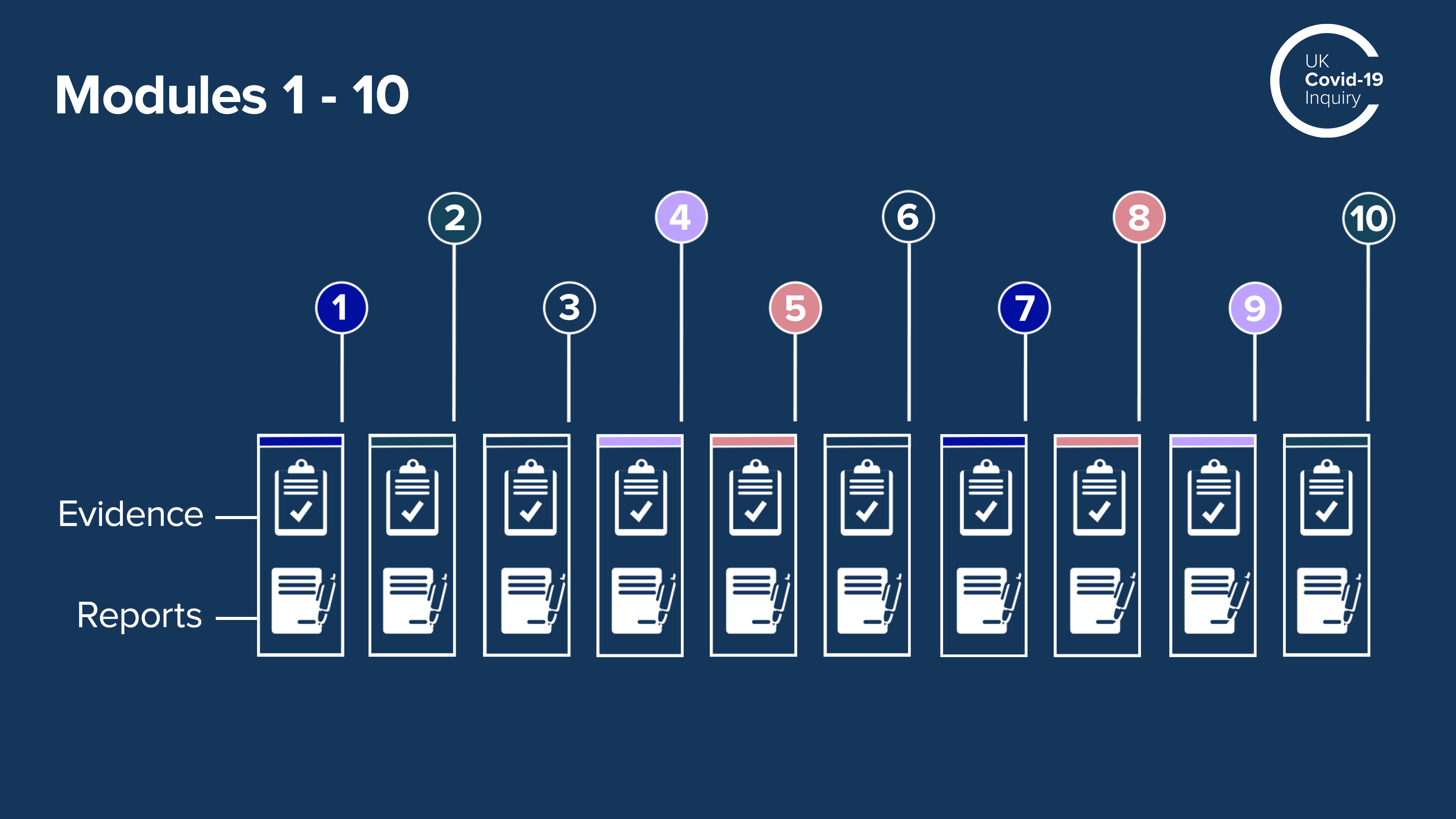
Above: each of the Inquiry’s modules will draw evidence from multiple sources, including hearings, statements provided by witnesses, written requests to individuals and organisations and (where applicable) Every Story Matters. A report will be published for each module.
How will we check that recommendations are being acted upon?
When we make recommendations to an organisation, we expect them to begin working towards implementation as soon as possible. While the Inquiry is running, we will check the progress that organisations are making in implementing recommendations as per the process on our website.
3 months after report publication
The Inquiry will write to the organisation responsible for implementing a recommendation, asking it to publish its response within the next three months. The response should detail the actions that will be taken and a timetable for doing so. As our Module 1 report into preparation and resilience was published in July, we have already recently written to the organisations to whom each recommendation was addressed.
6 months after report publication
If a response is not published, the Inquiry will send a further letter asking the organisation to publish a response imminently.
9 months after report publication
If a response has not been published, the Inquiry will send a third letter noting the fact that has not yet published its response. The Inquiry will publish the fact that it has written to the organisation three times.
12 months after report publication
If a response has not been published, the Inquiry will request that the organisation sets out their reasons for not having done so. The Inquiry will again state in public that it has requested this information and the response received will be published on the Inquiry’s website.
Although the Inquiry cannot force an organisation to implement Baroness Hallett’s recommendations, this process will help to ensure that recommendations are noted by the responsible institutions and that, where recommendations are accepted, a timetable for implementation is agreed.
An update on our Module 3 investigation into healthcare
We are halfway through public hearings for our Module 3 investigation into healthcare. So far we have heard from over 60 witnesses, whose names can be found on the Module 3 hearings timetable published on our website.
Topics that have come up in the public hearings so far include:
- Healthcare resources and staffing during the pandemic and how this impacted access to healthcare during this time
- How those who worked in healthcare coped with a crisis , including how that crisis affected their mental health and wellbeing, and their suggestions for doing things differently
- Access to maternity services during the pandemic
- The impact of shielding on clinically vulnerable people and how decisions about healthcare for these groups were made
- Controlling the spread of Covid-19 in hospitals and other healthcare settings
- Advice provided to the UK and devolved governments on clinical preparedness, resilience and response to the pandemic
As with all the Inquiry’s investigations, public hearings for Module 3 began with an impact film showing accounts from people from across the UK with experience of healthcare and or from people working in a healthcare setting during the pandemic. The Module 3 impact film is in two parts and the first part of the impact film is available to watch on our YouTube channel; please note that the video contains distressing material.
Module 3 hearings resumed on Monday 28 October and the second part of the impact film in relation to healthcare was screened on this date. You can also view this latest film on our YouTube channel.
If you would like to read more about the witnesses and topics covered during our public hearings, you can sign up to receive weekly email updates on the newsletter page of our website.
Public hearings for this module will continue until Thursday 28 November. Please see the hearings timetable on our website for details of timings and witnesses for upcoming hearings.
Inquiry announces Core Participants for Module 9 investigation into the economic response of the pandemic
The Inquiry has published the list of Core Participants for Module 9, which will investigate the economic response to the pandemic, following the preliminary hearing which took place on Wednesday 23 October. The recording of this hearing can be viewed on our YouTube channel and the transcript is available on our website.
A Core Participant is a person, institution or organisation that has a specific interest in the work of the Inquiry and has a formal role defined by legislation. Core Participants have special rights in the Inquiry process. These include receiving documentation, being represented and making legal submissions, suggesting questions and receiving advance notice of the Inquiry’s report.
You do not need to be a Core Participant to contribute to the work of the Inquiry and can do this by taking part in Every Story Matters, or sending information to be considered via the contact details on our website.
Every Story Matters public events
In October the Inquiry visited Coventry, Southampton, Nottingham and Leicester, speaking to over 3300 people about their experience of the pandemic.
In addition to our Every Story Matters drop-in events in these locations, the Inquiry visited the University of Southampton and University of Nottingham to encourage students and young people to share their pandemic experiences. You can read more about these visits on our website.
We worked with South Asian Health Action to listen to the pandemic experiences of South Asian and British Asian communities in Coventry, Nottingham and Leicester. We also worked with the Southampton Saints Foundation and Mansbridge Roundabout Cafe to meet with people from across the Southampton area and understand how the pandemic had affected them.
The Inquiry also spoke at the Union of Shop, Distributive and Allied Workers (USDAW) Black Members Conference in Manchester to raise awareness of Every Story Matters.
We are very grateful for the support from these organisations and all those who took the time to speak with us at our events.
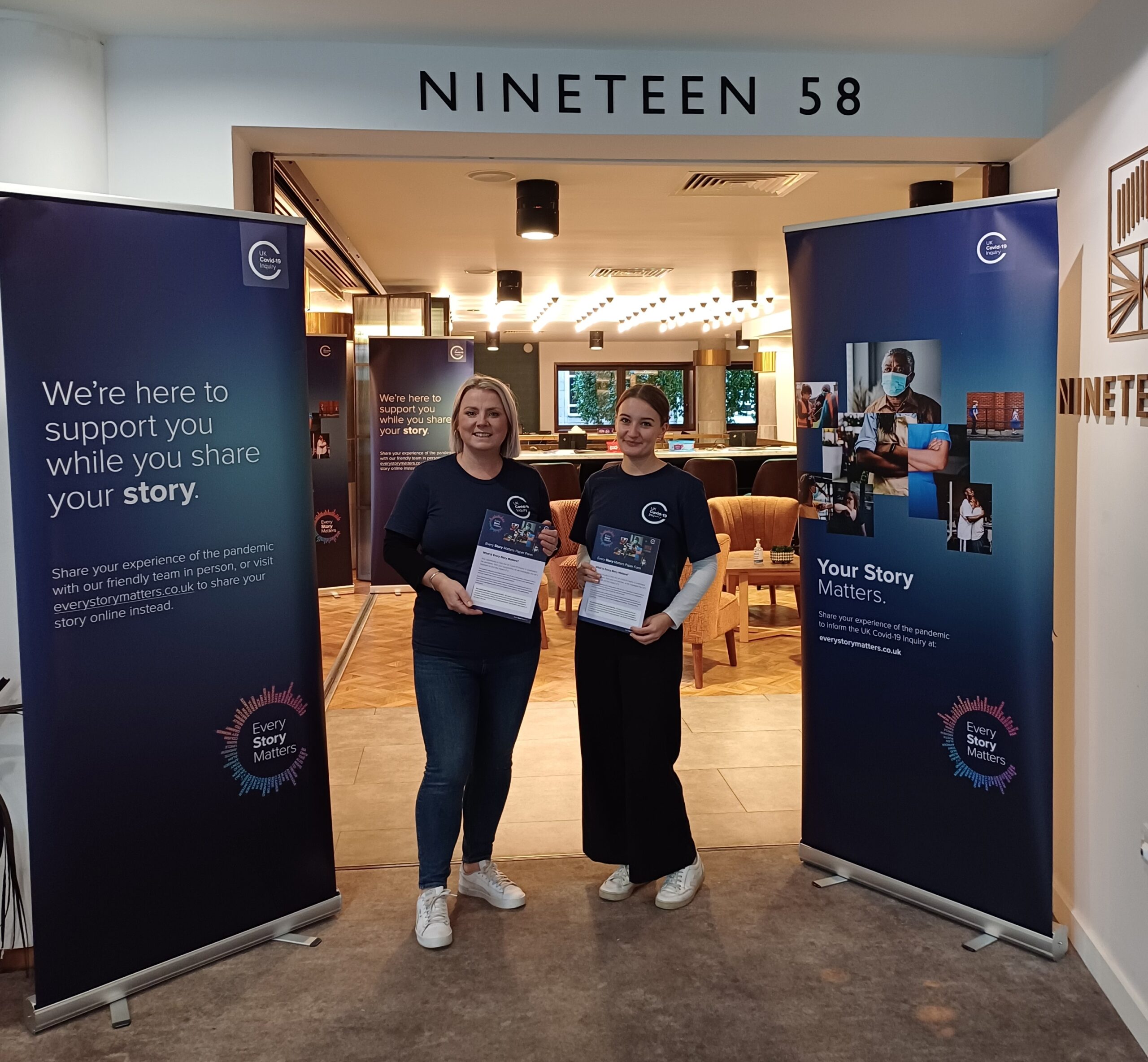
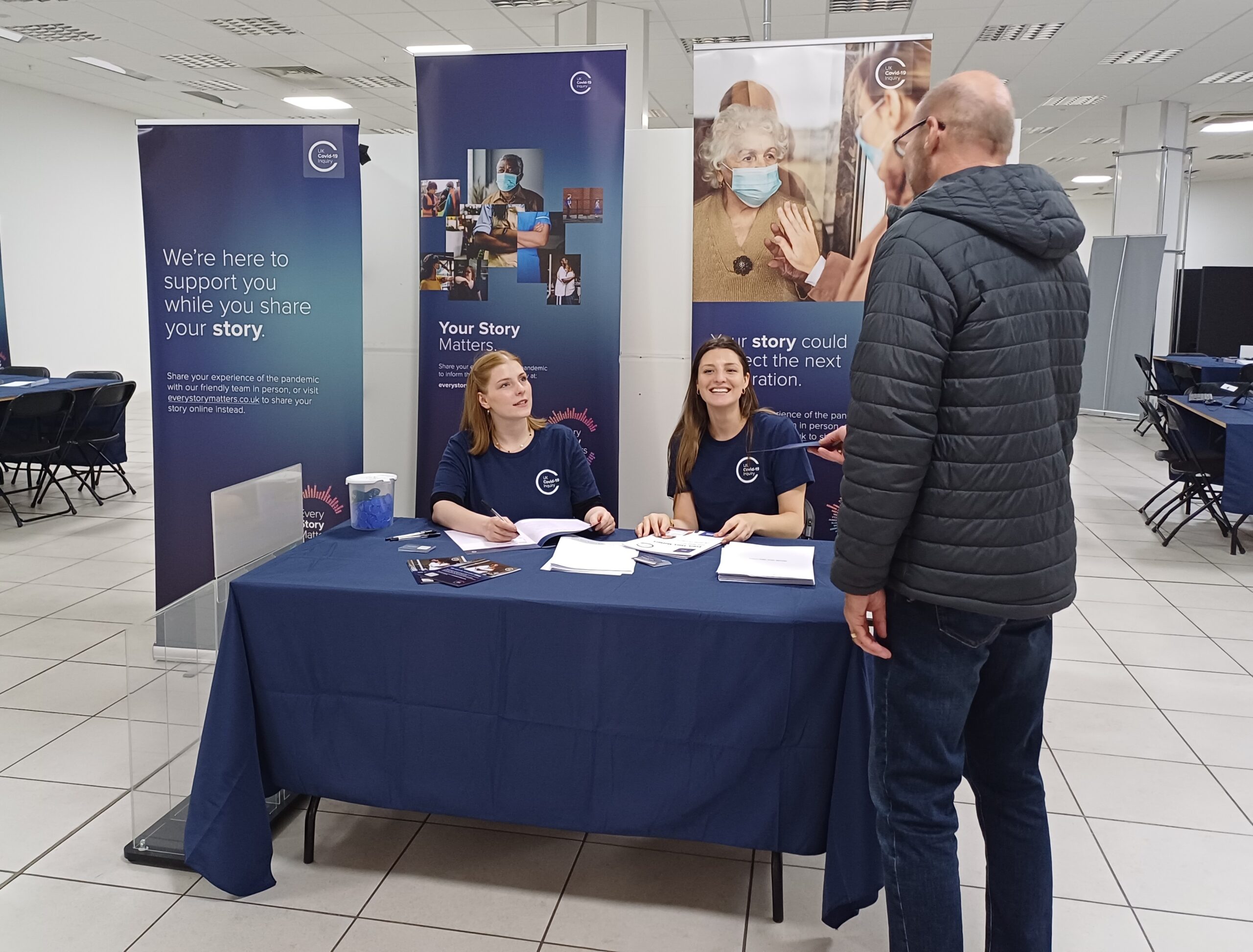
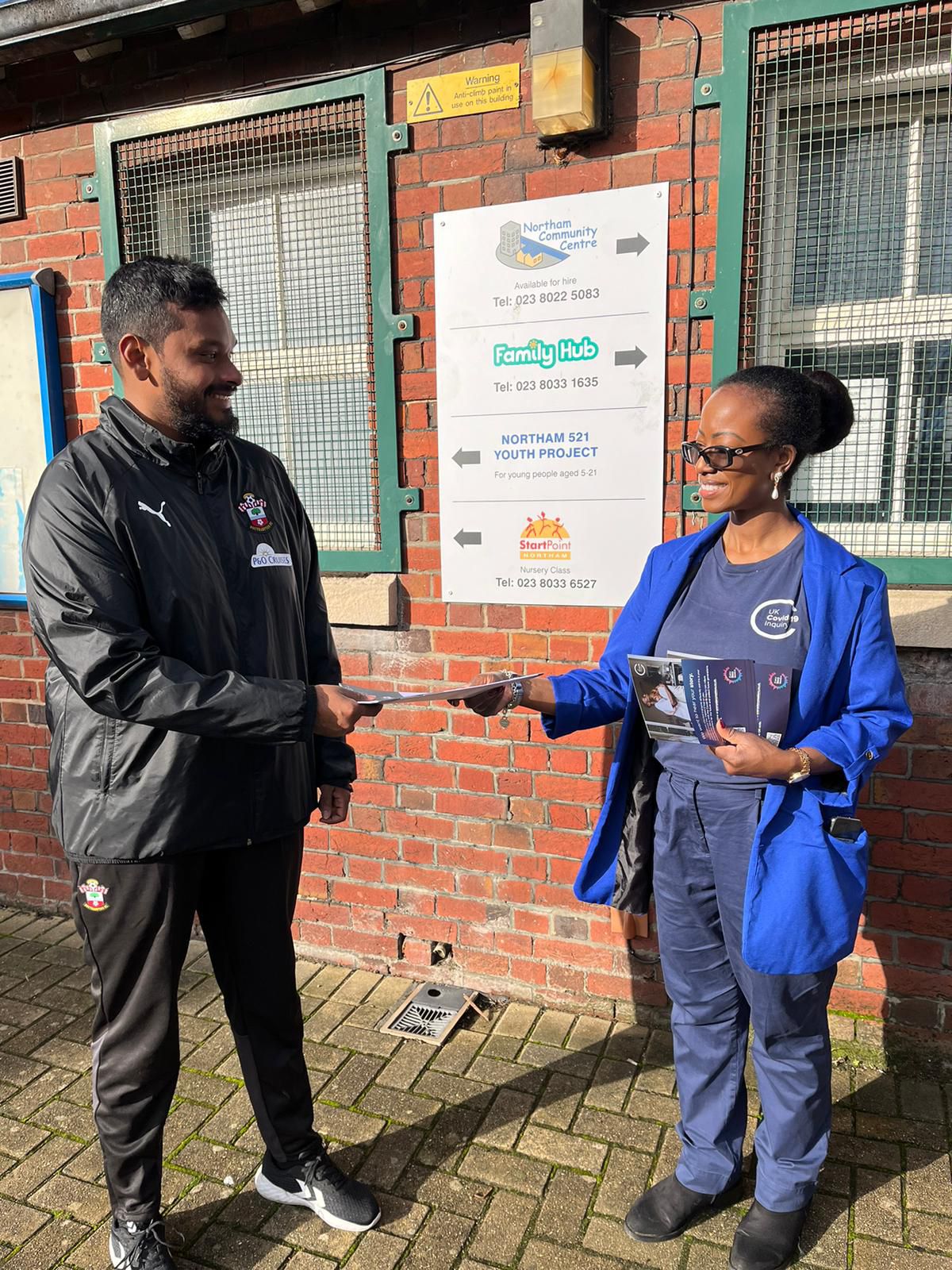
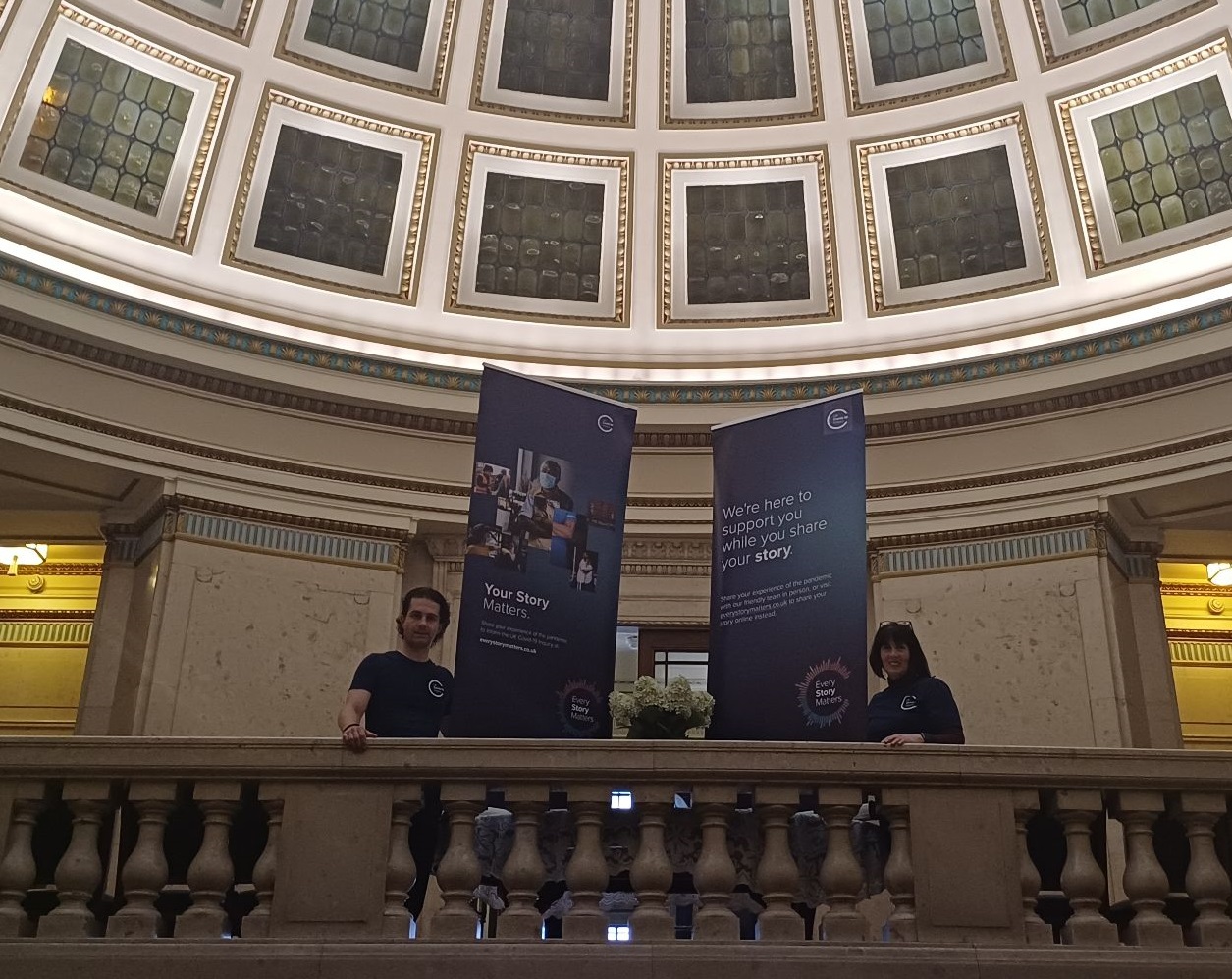
Above (clockwise from top left): at our Every Story Matters event in Coventry; meeting with the public at our Southampton event; raising awareness of Every Story Matters at Northam Community Centre, Southampton; at our Every Story Matters event at Nottingham Council House
Below: speaking with South Asian communities in Coventry (left) and Leicester (right)
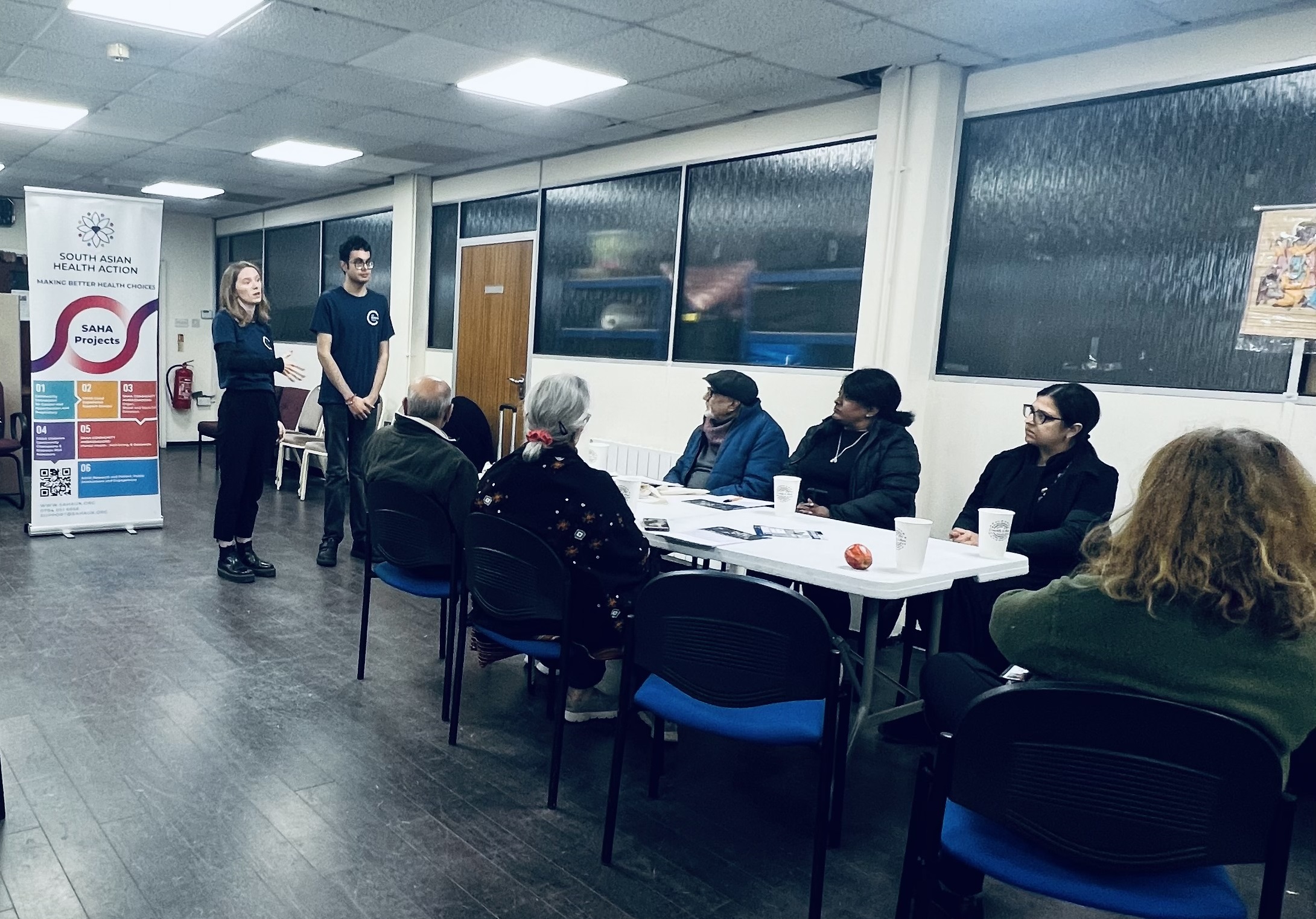
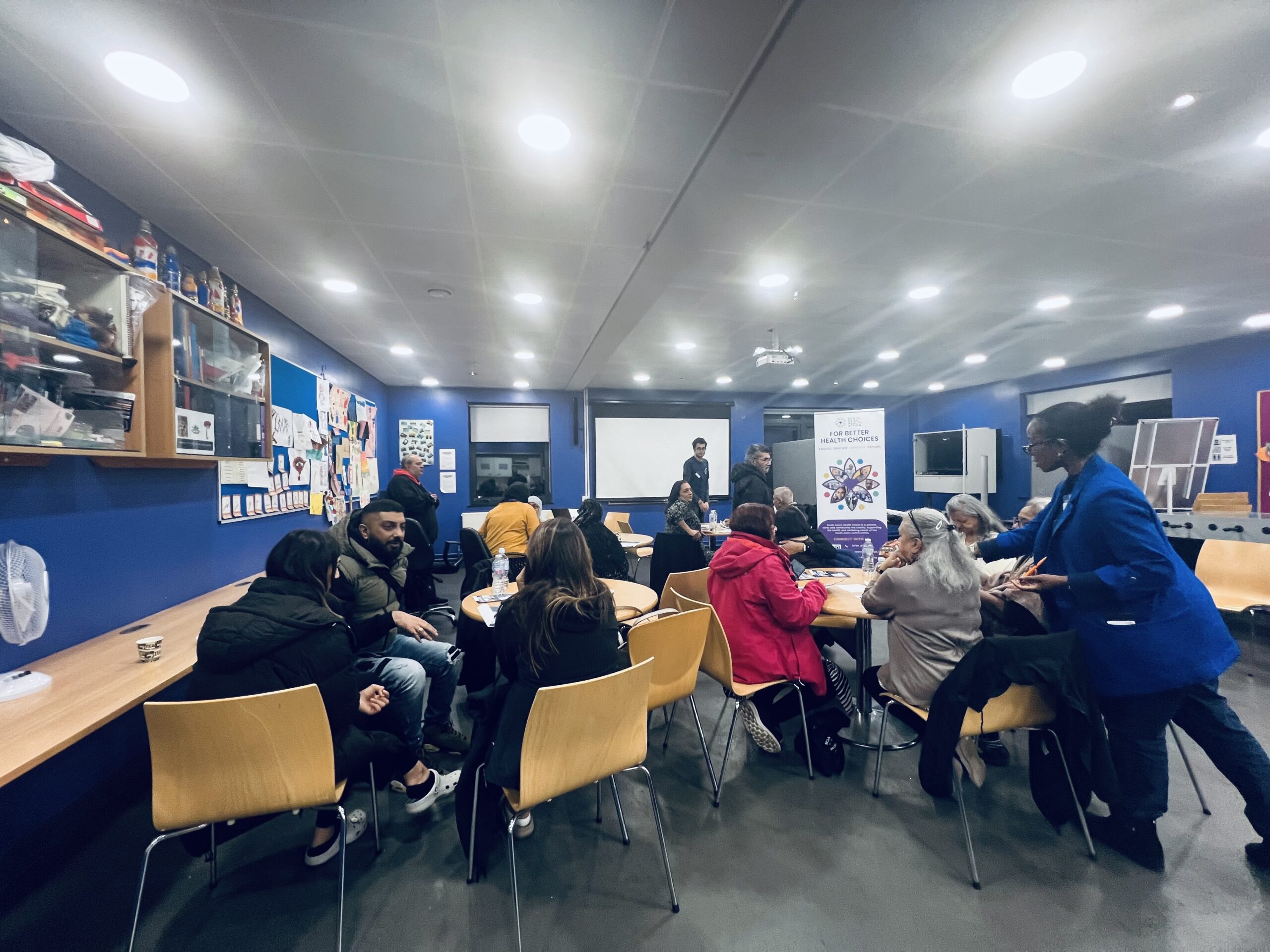
In early 2025 we will visit Manchester, Swansea and Bristol. We will update the events page on our website with details of these events soon, as well as announcing these in a future newsletter.
Bereaved forum
Did you lose a loved one during the pandemic? Do you want to get more involved in the Inquiry’s work?
The Inquiry hosts a ‘bereaved forum’ – which is a group of people who lost loved ones during the pandemic, who are consulted on aspects of our work. Forum participants provide their advice based on their personal experiences to inform the Inquiry’s approach to aspects of its work, for example its support and safeguarding strategy, its online presence, Every Story Matters and commemoration.
The bereaved forum is open to anyone who lost a loved one during the pandemic between 2020 and 2022.
Those on the bereaved forum will receive a regular email detailing opportunities to provide the Inquiry with advice on our Every Story Matters and commemoration work.
If you are interested in joining the forum mailing list, please email engagement@covid19.public-inquiry.uk.
If you need to talk to someone about losing a loved one then you can contact our emotional support provider, Hestia, by calling 0800 2465617 or emailing covid19inquiry.support@hestia.org. More information is available on our website.